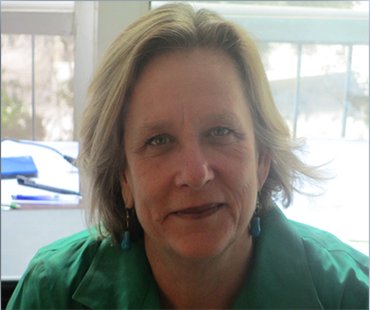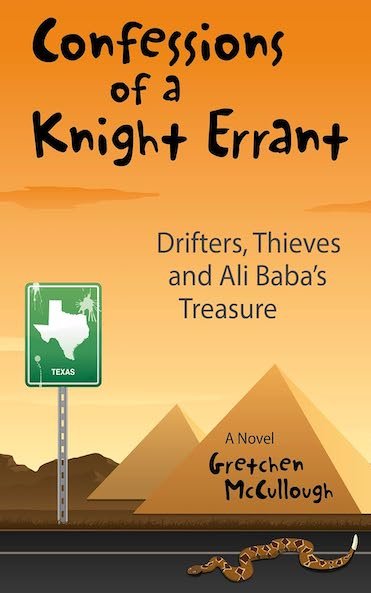Learning Arabic has given me access to so many more stories.
Gretchen McCullough grew up in Texas and, after living in other countries, she settled in Egypt. Now she writes between cultures and is on the faculty at the American University in Cairo. Her writing shares her fascination with the world and love of other cultures.
Lyndi: Readers have described Confessions of a Knight Errant as comedic, rollicking, rambunctious and comic. What story elements make it so funny and how does this offset the more serious parts?
Gretchen: I think my offbeat characters make it funny. They find themselves in absurd situations. One of my characters, Kharalombos is a Greek-Egyptian ballroom dancing teacher, who gives lessons in Cairo to movie stars and famous people. In real life, I took lessons from someone like this. I tried to imagine how he would adjust to life in the United States. Gary, the American professor is maladroit and hates technology, but is accused of being a cyber-terrorist. One part of me hates how technology has depersonalized our world. I think the serious parts are about how hard it is to go between cultures, even for expatriate Americans when they return. They feel misunderstood. I think the U.S. is much more insular than Americans want to admit, even if they think they understand the rest of the world. Our educational systems do not prioritize or encourage teaching languages. I am from South Texas, but only had three years of Spanish in school. Considering the fact that most people in my area are Spanish speakers, I should be fluent in Spanish. In Confessions, there are some huge misunderstanding between the Irish cook and the Spanish-speaking ladies who work in the kitchen with her.
I think knowing another language gives you a birds-eye view into another culture, another way of thinking about the world.
Lyndi: How much of your extensive historical research, makes it into your novels and how do you decide what to include or exclude?
Gretchen: I wouldn’t say that I did that much historical research for Confessions. Part I is based on my own experience of the 2011 uprising in Egypt; I just pulled the thread and exaggerated. For example, many expatriates fled Egypt and abandoned their pets. Most of them were cats and dogs, but in my novel there is a rabbit and a ferret! The rest of the novel takes place in Texas in the Hill Country. I did do some research on expensive summer camps in the area and went to visit one. I did some research on food inspections for restaurants; I also did some research on plumbing! In one part, the plumbing at the entire camp goes awry.
For my new novel, I did a great deal of research on West Texas and the New Deal in the 1930’s. I think research can inspire a writer if you don’t let it consume you. From the archival research I did at Sul Ross University, I got the idea to write about the swimming pool, Balmorhea, which was built by the Civilian Corps during the 1930’s. But you have to know when to stop! How will the research serve the story?
Lyndi: How does living in Cairo influence your writing and your writing business?
Gretchen: Wonderful question. It really has. I think that learning Arabic has given me access to so many more stories. For example, when I was learning Arabic, the doorman told me a few stories about neighbors in the building which inspired fiction. One of my neighbors threw an egg at his Egyptian neighbor and this caused an uproar. This incident grew into a story called “Taken Hostage by the Ugly Duck.” But what surprised me was that I told the story from the point-of-view of an Egyptian housewife, not the foreigner.
Shahrazad’s Tooth focuses on the interactions between Egyptians and expatriates. This collection was reprinted as Shahrazad’s Gift, recently published by Cune Press.
The biz part is harder since I am so far away, but hiring two publicists has helped. I have to really reach out to bloggers and other internet sites that target readers. Doing podcasts is difficult because my internet connection is weak. But really, what makes my work different is that I live outside of the country. My husband is Egyptian.
Lyndi: You write in a way that is between cultures. How is your writing received by these cultures?
Gretchen: When my first book came out, Three Stories from Cairo, I was a little nervous about how it would be received by Egyptians. My husband, the Egyptian poet and translator, Mohamed Metwalli translated the stories into Arabic. So the book is a bi-lingual book of short stories. He was sure that the stories would resonant with a Cairene audience. We heard that the book was passed around and read by many writers in downtown cafes in Cairo. Another Egyptian writer who reviewed the collection, Shahrazad’s Tooth, found it to be a sympathetic portrayal of the culture, which captured the natural humor of Egyptians.
Lyndi: Would you consider your stories as plot or character driven?
Gretchen: I think the short stories are probably driven by character. If someone is colorful, I am attracted to their story. Maybe I could also say this about Confessions. I wondered how my characters would behave out of Cairo, where they feel completely comfortable. In rural Texas, it is an entirely different story! They are both fish out of water, even the American expatriate.
Lyndi: You have written more than novels. What other types of writing do you write?
Gretchen: After I didn’t publish my first novel in the nineties, I focused on the short form. I started writing essays, reviews and short stories. Publishing so widely gave me confidence. After some time, I returned to the novel. I feel that I am essentially a novelist. I love the room I have in a novel, but I can also see the value of learning how to write in a shorter form. This sharpens your discipline and range.
Lyndi: What marketing methods have you found most effective in promoting your books?
Gretchen: I first published with a small independent press in Cairo. And then with a small independent press in the U.S, Cune. The personal touch is so nice, but smaller presses don’t have the resources to promote you. I have had to be more aggressive about promoting my work. I think having publicists who are constantly advocating for me or looking for opportunities has been a great help.
Gretchen McCullough was raised in Harlingen Texas. After graduating from Brown University in 1984, she taught in Egypt, Turkey and Japan. She earned her MFA in Creative Writing from the University of Alabama and was awarded a teaching Fulbright to Syria from 1997- 1999.
Her stories, essays and reviews have appeared in The Barcelona Review, Archipelago, National Public Radio, Story South, Guernica, The Common, The Millions, and the LA Review of Books. Translations in English and Arabic have been published in: Nizwa, Banipal, Brooklyn Rail in Translation, World Literature Today and Washington Square Review with Mohamed Metwalli. Her bi-lingual book of short stories in English and Arabic, Three Stories from Cairo, translated with Mohamed Metwalli was published in July 2011 by AFAQ Publishing House, Cairo. A collection of short stories about expatriate life in Cairo, Shahrazad’s Tooth, was also published by AFAQ in 2013. Most recently, her translation with Mohamed Metwalli of his poetry collection, A Song by the Aegean Sea was published by Laertes Press, 2022. Confessions of a Knight Errant: Drifters, Thieves and Ali Baba’s Treasure, a novel was published by Cune Press, Fall 2022. Shahrazad’s Gift, a collection of short stories was published February 2024 by the same press.
Currently, she is on the faculty at the American University in Cairo. Her website is:www.gretchenmcculloughfictionwriter.com
Shahrazad’s Gift is a collection of linked short stories, set in an apartment building in contemporary Cairo, with a melange of flamboyant, unlikely characters, Egyptian and expatriate, who seem to have stepped out of A Thousand and One Nights.
Confessions of a Knight Errant is a comedic, picaresque novel in the tradition of Don Quixote with a flamboyant cast of characters. Dr. Gary Watson is the picaro, a radical environmentalist and wannabe novelist who has been accused of masterminding a computer hack that wiped out the files of a major publishing company. His Sancho Panza is Kharalombos, a fat, gluttonous Greek dancing teacher, who is wanted by the secret police for cavorting with the daughter of the Big Man of Egypt. Self-preservation necessitates a hurried journey to the refuge of a girls’ camp in rural Texas. Then a body turns up nearby that is connected to Middle East antiquities, and they are on the run once more.




